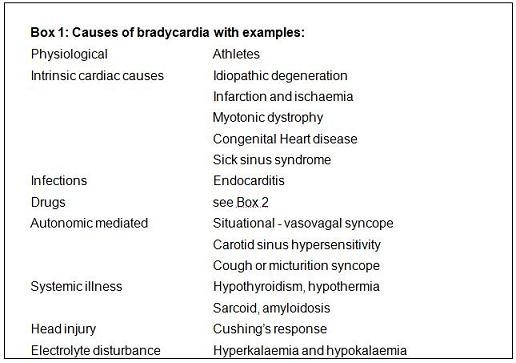
What Is the Most Common Cause of Bradycardia?
Bradycardia doesn’t always result in symptoms, but a sluggish heartbeat is typical, especially in athletes.
Bradycardia can be due to extreme fitness (as seen in athletes). However, it is frequently linked to other factors, such as:
- An irregular heartbeat or arrhythmia
- Hypothyroidism
- Heart tissue damage
- Electrolyte imbalance
- A congenital heart defect
- An infection of the heart tissue
- Medications used to manage high blood pressure
What is bradycardia?
Bradycardia is a term used to describe an abnormally slow heart rate.
- Adults’ resting heart rates typically range from 60 to 100 beats per minute (bpm).
- Bradycardia is characterized by heartbeats less frequent than 60 bpm.
- In physically fit people, heart rates as low as 40 bpm are achievable.
Bradycardia is typically a sign of cardiac problems. Your heart’s electrical system transmits signals to control your heartbeat. Any irregular alteration in the rhythm is referred to as an "arrhythmia." Bradycardia is an arrhythmia that causes a slower-than-normal heartbeat.
Bradycardia can appear in various ways. It is common in healthy children and adults, particularly during sleep. It can be caused by a malfunction of the heart’s internal electrical circuits or its internal timing. Treatment may be necessary depending on the type and degree of the condition.
What causes bradycardia?
A low resting heart rate may occur in some older people, athletes, and those who exercise frequently, but it is not a medical problem. Bradycardia can also have more severe causes, such as drug side effects, aging, cardiac problems, and other illnesses.
- Sick sinus syndrome: Develops when the heart’s natural pacemaker, the sinus node, fails to consistently initiate each heartbeat. The heart rate is slow and erratic because it triggers some heartbeats but not all. Older adults are at a higher risk of experiencing sick sinus syndrome, but it can happen to anyone.
- Risk factors for sick sinus syndrome include previous heart surgery, atherosclerosis, blood pressure medications, and age over 70 years.
- Heart block: Results when the electrical signal that contracts the atria does not always reach the ventricles.
- Heart blocks are of two types: 2:1 heart block, which occurs when the ventricles only contract once every two times the atria contract, and complete heart block, where the upper and lower chambers of the heart are unable to communicate with one another. The ventricles compensate for this as substitute pacemakers, but the rate is not as regular and effective.
- Risk factors for heart block include heart illness or a heart attack in the past, exposure to specific poisons, specific drugs such as digitalis, Lyme illness, and certain congenital conditions.
- Electrolyte imbalances: Your heart rate may be affected if you don’t have adequate levels of electrolytes including calcium, magnesium, and potassium in your blood.
- Inflammation: Refers to inflammation of your heart’s pericardium, myocardium, or endocardium.
- Rheumatic heart disease and rheumatic fever: Rheumatic fever can develop from untreated bacterial infections like strep throat, which can then lead to rheumatic heart disease.
- Drugs: Certain medications, including narcotic pharmaceuticals, lithium, beta-blockers, calcium-channel blockers, antiarrhythmia drugs, and antidepressants, can cause bradycardia. Recreational substance use, such as cannabis (marijuana), can also cause bradycardia.
- Lyme disease: Caused by microorganisms transmitted by tick bites. If left untreated, Lyme disease can harm the heart.
- Chagas disease: Caused by a parasite transmitted by "kissing bugs," which are blood-sucking insects.
Other causes of bradycardia
- Severe hypothermia or hypoxia
- Obstructive sleep apnea
- Hypothyroidism
- High pressure inside the skull
- Duchenne muscular dystrophy
- Long Q-T syndrome
- Scleroderma
- Lupus
- Anorexia nervosa
IMAGES
What are the symptoms of bradycardia?
Bradycardia does not necessarily result in symptoms. A sluggish heartbeat may be typical in some people, such as athletes.
The most typical signs of bradycardia include:
- Tiredness (fatigue)
- Weakness
- Reduced exercise ability
- Chest pain
- Swelling in the legs and feet
- Shortness of breath
- Dizziness or fainting
- Palpitations
- Irregular heartbeats
- Confusion
- Memory problems
How is it diagnosed?
A physical examination combined with tests that gauge your heart rate and examine its rhythm can help a doctor identify bradycardia.
Physical examination
During a physical examination, a medical professional will examine your body for any symptoms or issues. They will also examine your chest and listen to your heartbeats.
Other tests
The following tests are likely to detect bradycardia:
- ECG: Essential for detecting bradycardia as it can precisely follow the electrical activity of your heart.
- Echocardiography or echo: Used to examine the functioning of heart chambers and valves.
- Electrolyte levels: Evaluate your blood’s concentration of electrolytes, including calcium, potassium, and magnesium.
- Thyroid hormone concentrations: Bradycardia can be caused by hypothyroidism.
- Cardiac troponin: A protein found in the cells of your heart muscle, which can indicate cardiac disease.
- Toxicology examination: Searches your blood for harmful chemicals.
How is bradycardia treated?
Bradycardia may require different treatments depending on the cause, type, and severity of your symptoms.
Treatment for bradycardia may include:
- Treating the underlying cause
- Medication to increase your heartbeat
- Temporary pacing
- A permanent pacemaker


